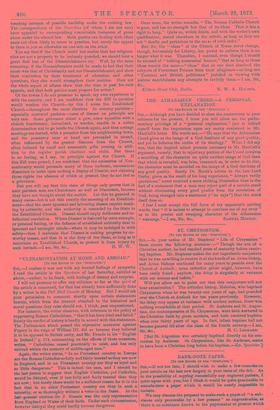"ULTRAMONTANISM AT HOME AND ABROAD."
[TO THE EDITOR OF THE "SPECTATOR.]
confess it was not with my wonted feelings of sympathy I read the article in the Spectator of last Saturday, entitled as above,—rather, to be frank, with feelings of dismay and surprise.
I will not presume to offer any criticism so far as the spirit of the article is concerned, for that has already been sufficiently done by a writer in the Pall Mall Gazette of Monday. But I would ask your permission to comment shortly upon certain statements therein, which from the interest attached to the historical and moral questions they raise should not, I think, pass unquestioned.
For instance, the writer observes, with reference to the policy of suppressing Roman Catholicism, "that it has been tried and failed." Surely the verdict of history is hardly in accord with this statement The Parliaments which passed the repressive measures against- Popery in the reign of William III. did so because they believed it to be opposed to British unity, and Mr. Froude in his "English in Ireland," p. 274, commenting on the effects of these measures, writes, " Catholicism ceased practically to exist, and has only revived within the memory of middle-aged men."
Again, the writer states, "In no Protestant country in Europe are the Roman Catholics so fully and fairly treated as theyare now In England, and in no Protestant country are they se loyal and so little dangerous." This is indeed the ease, and I should be the last paten to suggest that English Catholics, qua Catholics, would-be disloyal, even if less fully and fairly treated than they are now; but surely there would be a sufficient reason for it in the fact that in no other Protestant country are they in such a minority, or so thoroughly -without a voice in the State. At the lent general eleetiou Sir J. Simeon was the only -representative from England or Wales of their faith. Under such circumstances, however disloyal they could hardly become dangerous.
Once more, the writer remarks, "The Roman Catholic Church is poor, and has no strength but that of its ideas. That it has a right to keep." Quite so, within limits, and with the writer's own qualification, stated elsewhere in the article, as long as they are not "deadly and pernicious to the caus of civil order."
But, Sir, the " ideas " of the Church of Rome never change, though, fortunately for Liberty, her power to enforce them is no longer what it was. Therefore, I contend, even though I should be accused of "talking nonsensical bounce," that as long as these ideas remain the same—" ideas" that at one time absolved the subjects of Protestant Princes from their allegiance—so long are "Teutonic and British politicians" justified in viewing with jealous watchfulness any attempts to revivify them.—I am, Sir,. &c.,






































 Previous page
Previous page